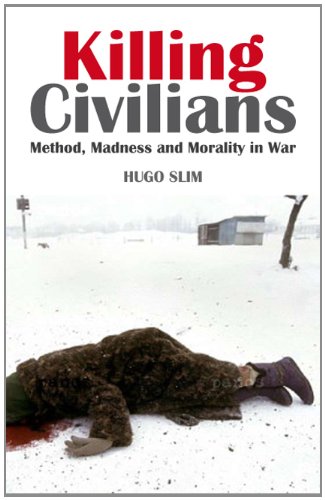Items related to Killing Civilians: Method, Madness and Morality in...

Synopsis
This is a book about how civilians suffer in war and why people decide that they should. Most civilian suffering in war is deliberate and always has been. Massacres, rape, displacement, famine and disease are usually designed. They are policies in war. In meetings or on mobile phones, political and military leaders decide that civilians are appropriate or inevitable targets. The principle that unarmed and innocent people should be protected in war is an ancient, precious but fragile idea. Today, the principle of civilian immunity is enshrined in modern international law and cherished by many. But, in practice, leaders in most wars reject the principle.Using detailed historical and contemporary examples, "Killing Civilians" looks at the many ways in which civilians suffer in wars and analyses the main anti-civilian ideologies which insist upon such suffering. It also exposes the very real ambiguity in much civilian identity which is used to justify extreme hostility. But this is also, above all, a book about why civilians should be protected. Throughout its pages, "Killing Civilians" argues for a morality of limited warfare in which tolerance, mercy and restraint are used to draw boundaries to violence. At the heart of the book are important new frameworks for understanding patterns of civilian suffering, ideologies of violence and strategies for promoting the protection of civilians.This is the first major treatment of the hard questions of civilian identity and protection in war for many years. Written by one of the humanitarian world's leading thinkers and former aid worker, it provides a unique and accessible text on the subject for professional and public readerships alike.
"synopsis" may belong to another edition of this title.
About the Author
Hugo Slim was recently the chief scholar at the Centre for Humanitarian Dialogue in Geneva, a conflict resolution organization that mediates in civil wars and advises on peace processes.
Review
A remarkable book. It is rare to encounter such an unflinching and thorough dissection of the brutality we humans are capable of, recounted with such humanity. Hugo Slim's message is ultimately encouraging to those of us striving to protect the rights of children and their communities in today's conflicts and should be applauded.
(Jasmine Whitbread, chief executive of Save the Children, UK)This is an essential text on the hideous but important topic of why and how soldiers kill noncombatants. Hugo Slim explores the moral reasoning behind both lethal violence against civilians and the traditions of mercy and restraint that have sustained a small but precious space for humanity in warfare.
(Alex de Waal, program director, Social Science Research Council)An excellent book for the practitioner, whether political, humanitarian, or military, as well as for the general public in whose name they act.
(General Sir Rupert Smith, author of The Utility of Force: The Art of War in the Modern World)[Slim is] skillfully weaving history and psychology together with a sense of contemporary mission.
(Steven Poole The Guardian)A clear, impartial, honest work... brought alive by a myriad of vivid historical, contemporary and personal anecdotes. In short, it is very good.
(The Economist)Any attempt to carve out a humanitarian space in the midst of bitter conflicts faces tough challenges, but Slim's book is an important reminder of why it is vital to try.
(Lawrence D. Freedman Foreign Affairs)Well-written and engaging.
(Colm McKeogh H-War)Using accessible language and historical examples, Slim juxtaposes human psychology and history in a clever and engaging way.
(Dr Narelle Biedermann Australian Army Journal 1900-01-00)The author presents human motivations for violence realistically, in detail, and without blinking.
(Thomas B. Grassey Parameters 1900-01-00)"About this title" may belong to another edition of this title.
- PublisherC Hurst & Co Publishers Ltd
- Publication date2007
- ISBN 10 1850658811
- ISBN 13 9781850658818
- BindingHardcover
- LanguageEnglish
- Edition number1
- Number of pages300
- Rating
Shipping:
US$ 16.50
From Australia to U.S.A.
Search results for Killing Civilians: Method, Madness and Morality in...
Killing Civilians: Method Madness & Morality In War
Seller: THE CROSS Art + Books, Sydney, NSW, Australia
22.5 x 14.5cms 320pp fine hardcover & dustwrapper This book looks at the ways that people suffer in wars and analyses the main anti-civilian ideologies which insist upon such suffering. If looks at the reasons and arguments for limiting human violence in war. Seller Inventory # 20100551
Quantity: 1 available
Killing Civilians: Method, Madness and Morality in War
Seller: Oakholm Books, Aberfeldy, United Kingdom
Hardcover. Condition: Near Fine. Dust Jacket Condition: Very Good. Clean and unmarked book; jacket lightly worn on top edge and scratched on back. Seller Inventory # 002935
Quantity: 1 available
Killing Civilians
Seller: dsmbooks, Liverpool, United Kingdom
Hardcover. Condition: Like New. Like New. book. Seller Inventory # D7F5-8-M-1850658811-6
Quantity: 1 available

